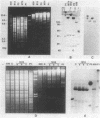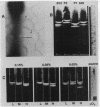Abstract
Though amenable to routine manipulation and a popular subject of molecular genetic and biochemical studies on archaebacteria, the genus Sulfolobus has remained poorly described in phenotypic terms. To delineate their physiological capabilities and diversity, five laboratory strains, including type strains of the described species Sulfolobus acidocaldarius and S. solfataricus, were compared with respect to a variety of growth and biochemical parameters, including component profile of the surface-layer cell wall, inhibitors of growth, growth rate as a function of temperature and pH, and compounds used as sole sources of carbon or nitrogen. Motility and photoregulated production of an orange pigment were detected in all five strains tested. The results provide new criteria for distinguishing Sulfolobus strains as well as potential tools for the physiological and genetic manipulation of these extreme thermophiles.
Full text
PDF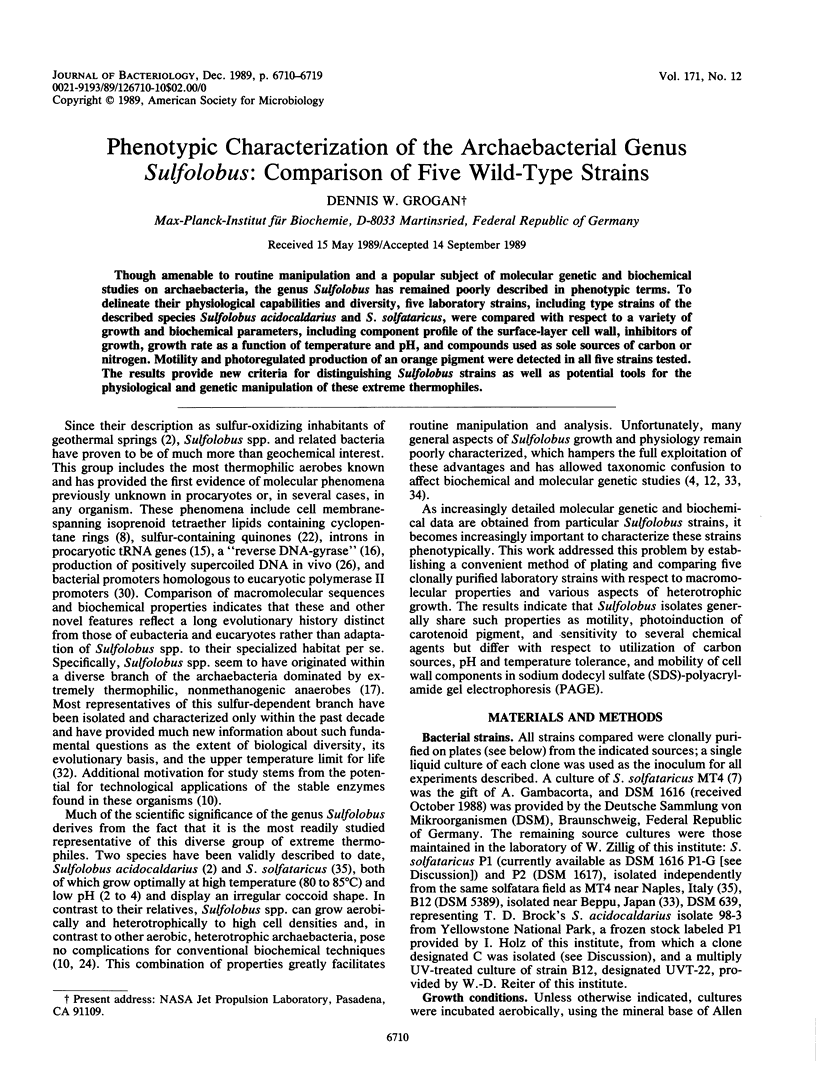
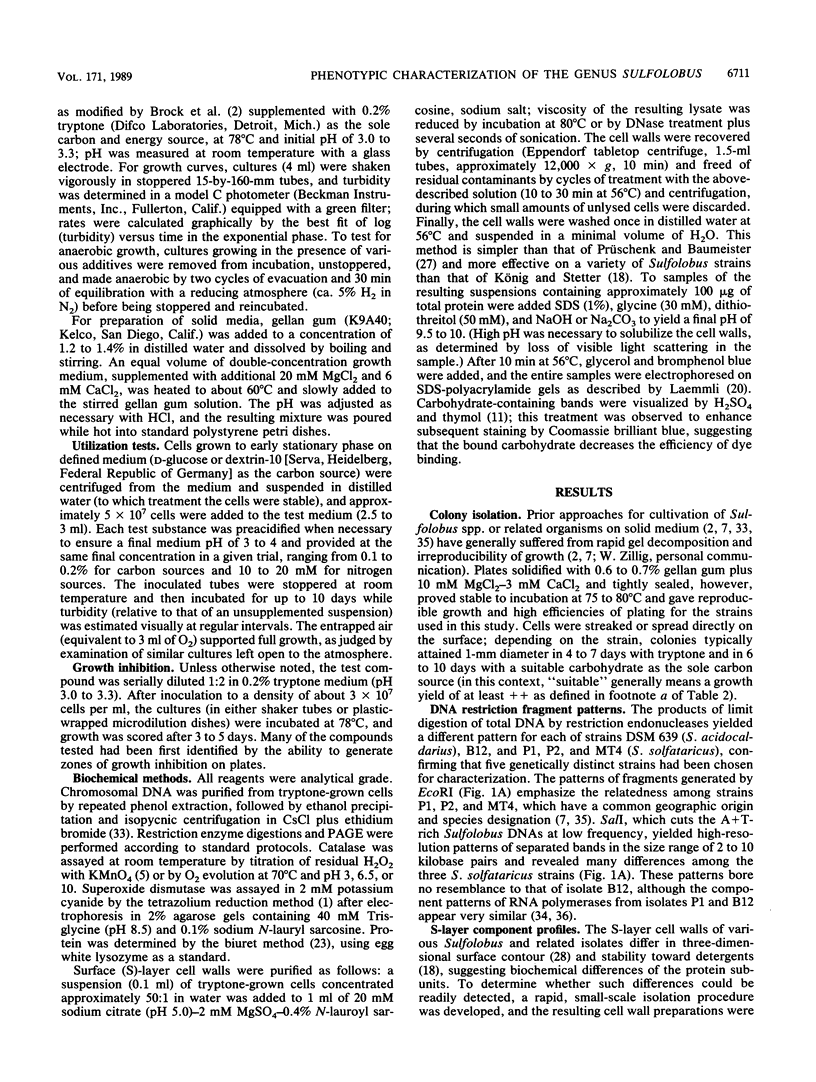
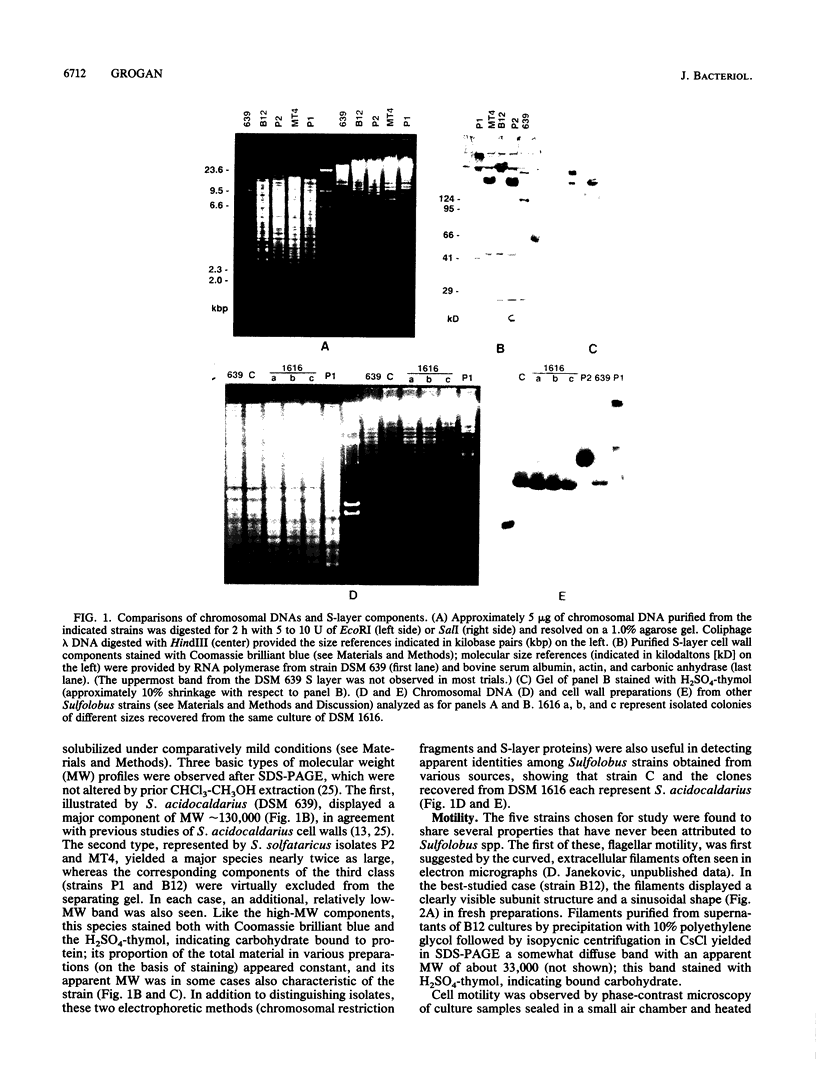
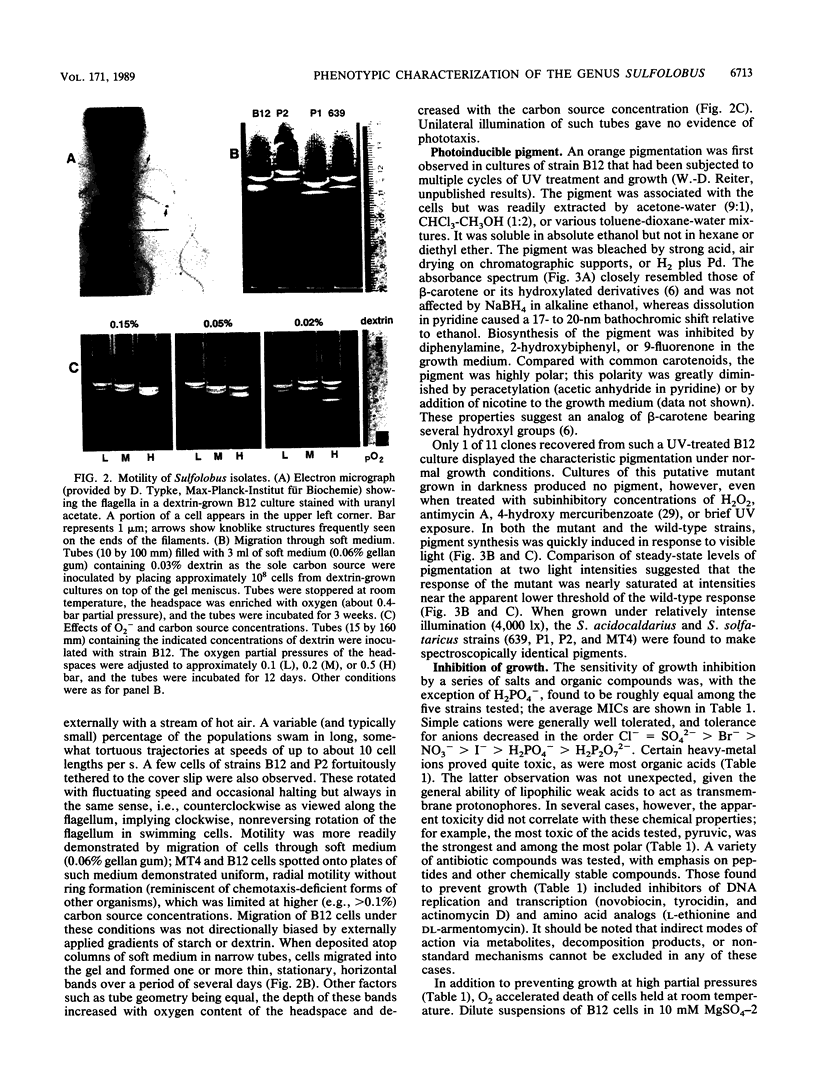
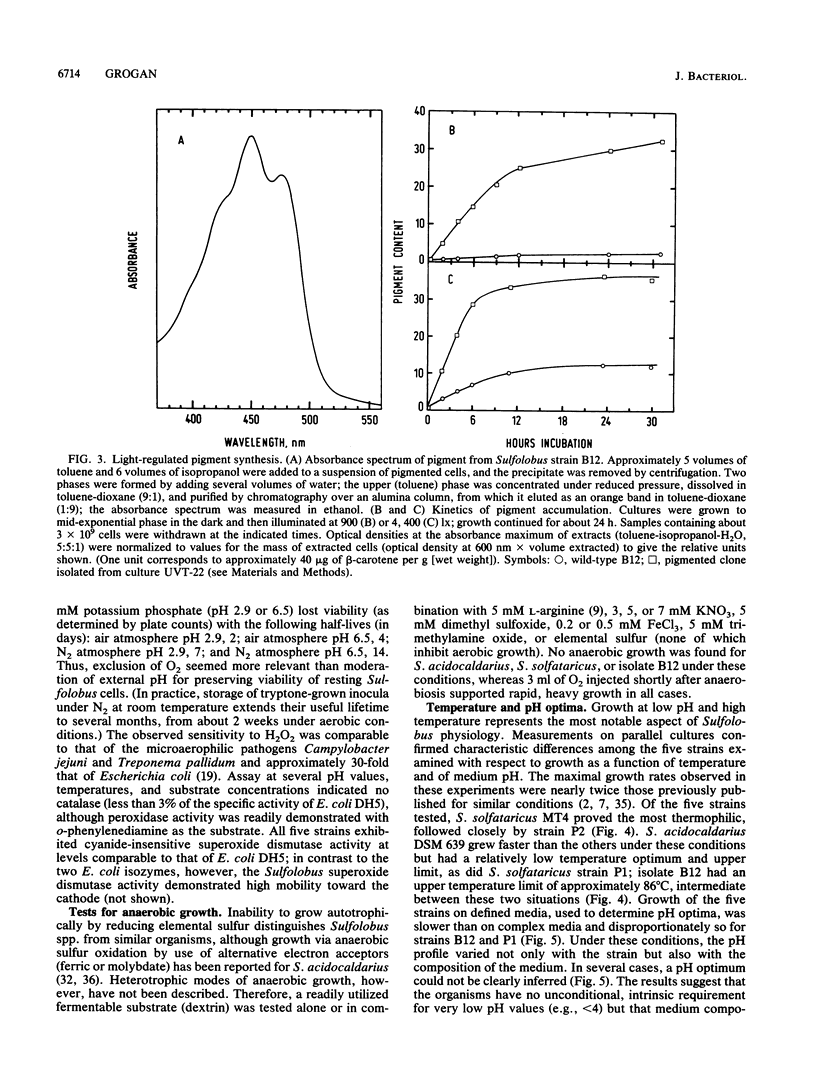
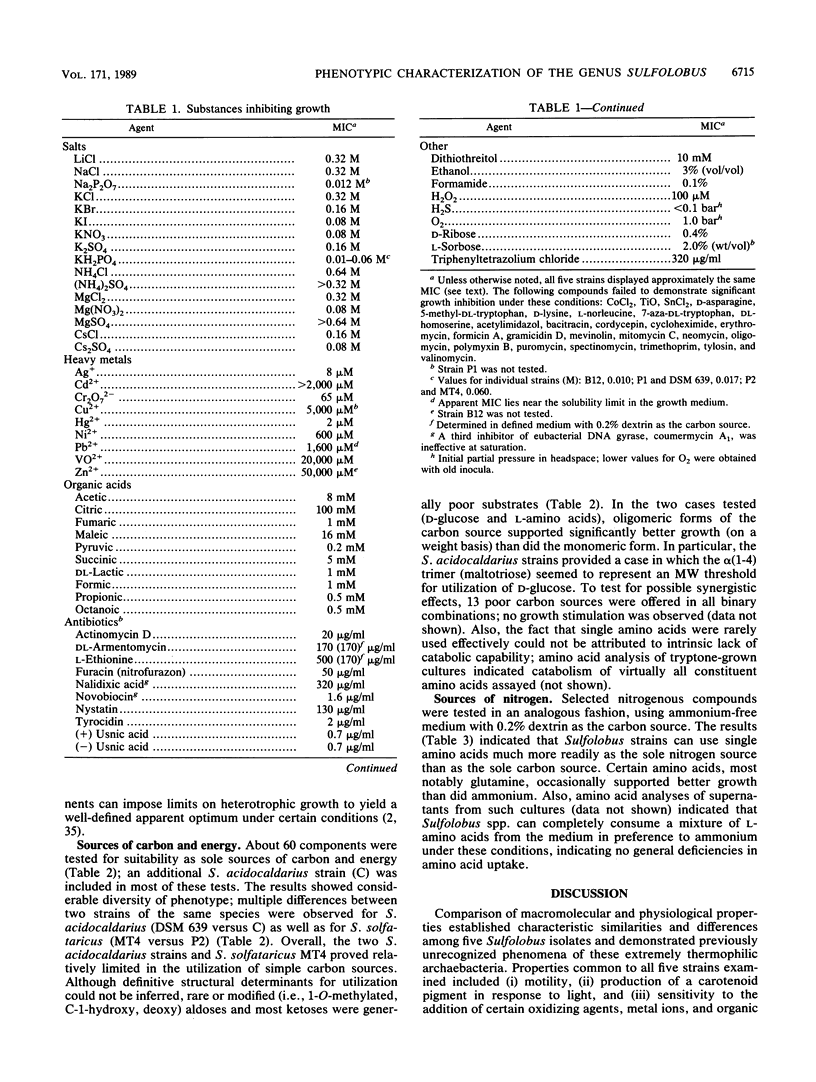
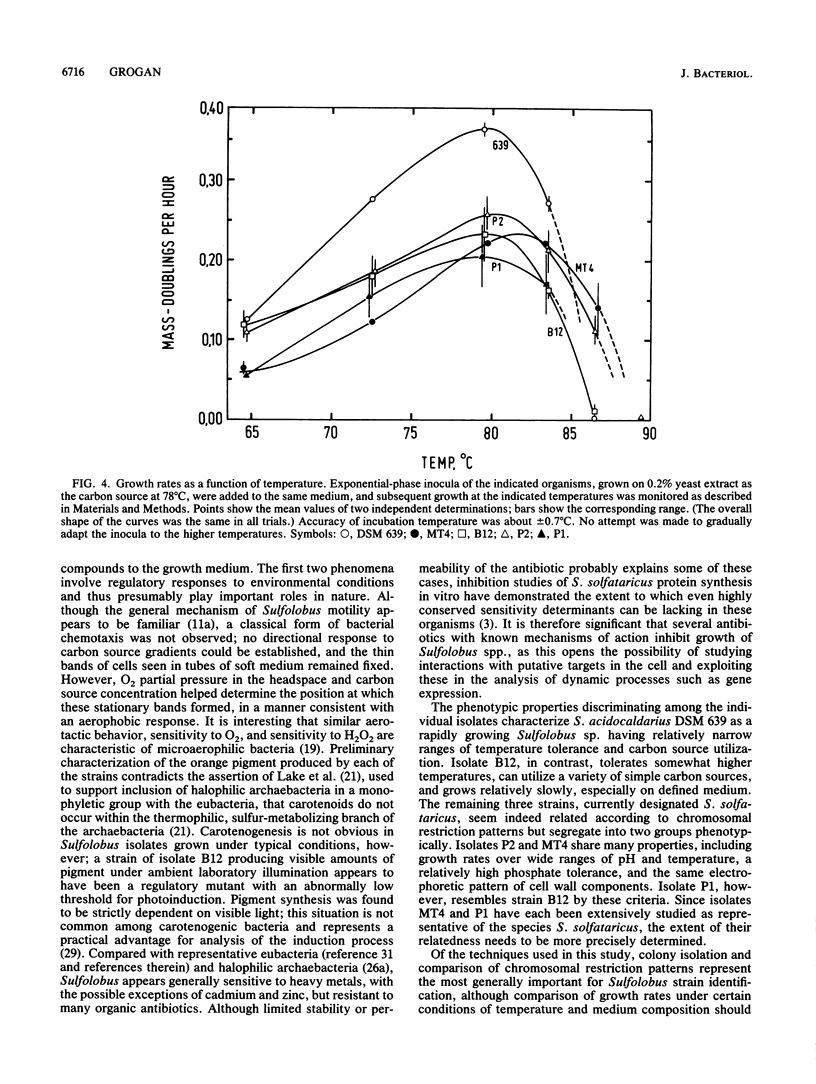
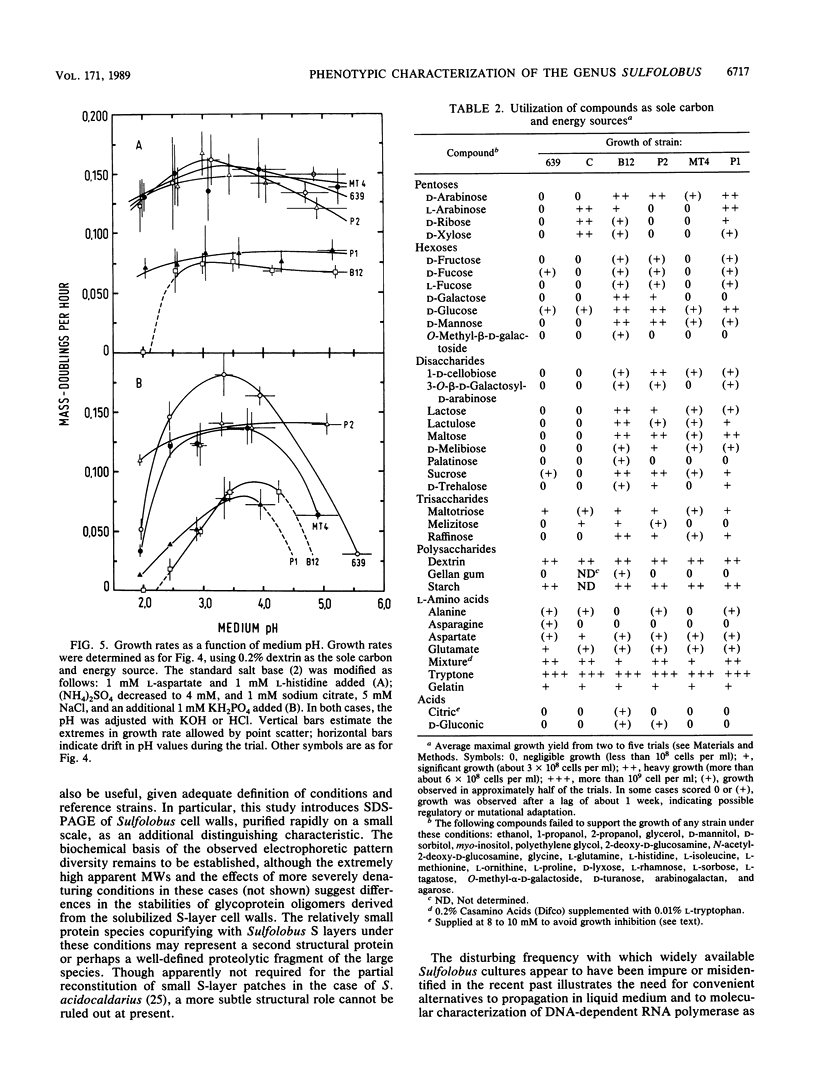
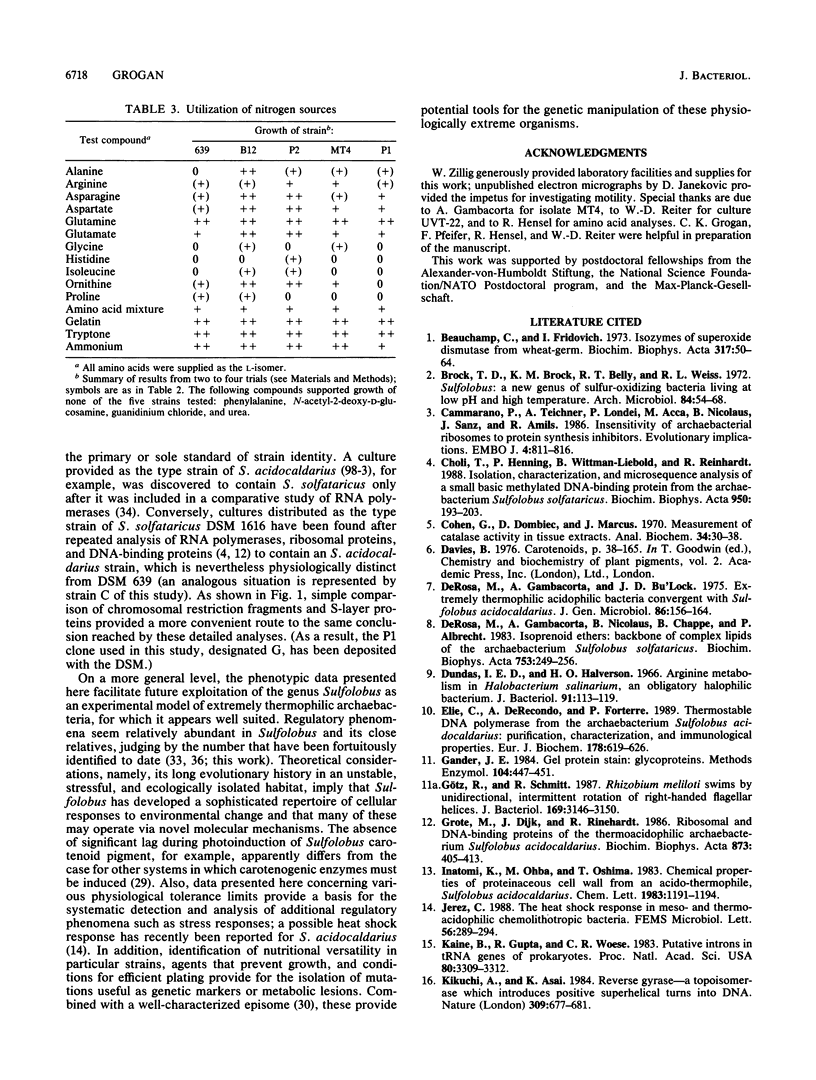
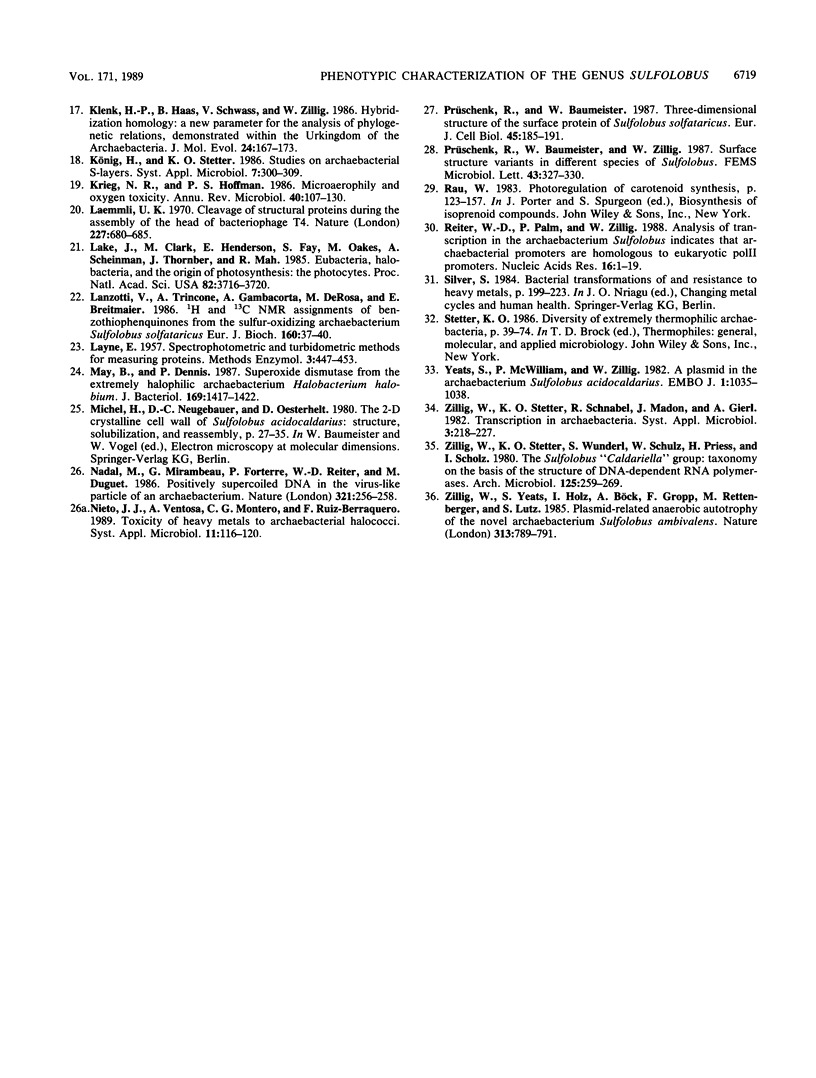
Images in this article
Selected References
These references are in PubMed. This may not be the complete list of references from this article.
- Beauchamp C. O., Fridovich I. Isozymes of superoxide dismutase from wheat germ. Biochim Biophys Acta. 1973 Jul 12;317(1):50–64. doi: 10.1016/0005-2795(73)90198-0. [DOI] [PubMed] [Google Scholar]
- Brock T. D., Brock K. M., Belly R. T., Weiss R. L. Sulfolobus: a new genus of sulfur-oxidizing bacteria living at low pH and high temperature. Arch Mikrobiol. 1972;84(1):54–68. doi: 10.1007/BF00408082. [DOI] [PubMed] [Google Scholar]
- Cammarano P., Teichner A., Londei P., Acca M., Nicolaus B., Sanz J. L., Amils R. Insensitivity of archaebacterial ribosomes to protein synthesis inhibitors. Evolutionary implications. EMBO J. 1985 Mar;4(3):811–816. doi: 10.1002/j.1460-2075.1985.tb03702.x. [DOI] [PMC free article] [PubMed] [Google Scholar]
- Choli T., Henning P., Wittmann-Liebold B., Reinhardt R. Isolation, characterization and microsequence analysis of a small basic methylated DNA-binding protein from the Archaebacterium, Sulfolobus solfataricus. Biochim Biophys Acta. 1988 Jul 13;950(2):193–203. doi: 10.1016/0167-4781(88)90011-5. [DOI] [PubMed] [Google Scholar]
- Cohen G., Dembiec D., Marcus J. Measurement of catalase activity in tissue extracts. Anal Biochem. 1970 Mar;34:30–38. doi: 10.1016/0003-2697(70)90083-7. [DOI] [PubMed] [Google Scholar]
- Dundas I. E., Halvorson H. O. Arginine metabolism in Halobacterium salinarium, an obligately halophilic bacterium. J Bacteriol. 1966 Jan;91(1):113–119. doi: 10.1128/jb.91.1.113-119.1966. [DOI] [PMC free article] [PubMed] [Google Scholar]
- Elie C., De Recondo A. M., Forterre P. Thermostable DNA polymerase from the archaebacterium Sulfolobus acidocaldarius. Purification, characterization and immunological properties. Eur J Biochem. 1989 Jan 2;178(3):619–626. doi: 10.1111/j.1432-1033.1989.tb14490.x. [DOI] [PubMed] [Google Scholar]
- Gander J. E. Gel protein stains: glycoproteins. Methods Enzymol. 1984;104:447–451. doi: 10.1016/s0076-6879(84)04112-4. [DOI] [PubMed] [Google Scholar]
- Götz R., Schmitt R. Rhizobium meliloti swims by unidirectional, intermittent rotation of right-handed flagellar helices. J Bacteriol. 1987 Jul;169(7):3146–3150. doi: 10.1128/jb.169.7.3146-3150.1987. [DOI] [PMC free article] [PubMed] [Google Scholar]
- Kaine B. P., Gupta R., Woese C. R. Putative introns in tRNA genes of prokaryotes. Proc Natl Acad Sci U S A. 1983 Jun;80(11):3309–3312. doi: 10.1073/pnas.80.11.3309. [DOI] [PMC free article] [PubMed] [Google Scholar]
- Kikuchi A., Asai K. Reverse gyrase--a topoisomerase which introduces positive superhelical turns into DNA. Nature. 1984 Jun 21;309(5970):677–681. doi: 10.1038/309677a0. [DOI] [PubMed] [Google Scholar]
- Krieg N. R., Hoffman P. S. Microaerophily and oxygen toxicity. Annu Rev Microbiol. 1986;40:107–130. doi: 10.1146/annurev.mi.40.100186.000543. [DOI] [PubMed] [Google Scholar]
- Laemmli U. K. Cleavage of structural proteins during the assembly of the head of bacteriophage T4. Nature. 1970 Aug 15;227(5259):680–685. doi: 10.1038/227680a0. [DOI] [PubMed] [Google Scholar]
- Lake J. A., Clark M. W., Henderson E., Fay S. P., Oakes M., Scheinman A., Thornber J. P., Mah R. A. Eubacteria, halobacteria, and the origin of photosynthesis: the photocytes. Proc Natl Acad Sci U S A. 1985 Jun;82(11):3716–3720. doi: 10.1073/pnas.82.11.3716. [DOI] [PMC free article] [PubMed] [Google Scholar]
- Lanzotti V., Trincone A., Gambacorta A., De Rosa M., Breitmaier E. 1H and 13C NMR assignment of benzothiophenquinones from the sulfur-oxidizing archaebacterium Sulfolobus solfataricus. Eur J Biochem. 1986 Oct 1;160(1):37–40. doi: 10.1111/j.1432-1033.1986.tb09936.x. [DOI] [PubMed] [Google Scholar]
- May B. P., Dennis P. P. Superoxide dismutase from the extremely halophilic archaebacterium Halobacterium cutirubrum. J Bacteriol. 1987 Apr;169(4):1417–1422. doi: 10.1128/jb.169.4.1417-1422.1987. [DOI] [PMC free article] [PubMed] [Google Scholar]
- Reiter W. D., Palm P., Zillig W. Analysis of transcription in the archaebacterium Sulfolobus indicates that archaebacterial promoters are homologous to eukaryotic pol II promoters. Nucleic Acids Res. 1988 Jan 11;16(1):1–19. doi: 10.1093/nar/16.1.1. [DOI] [PMC free article] [PubMed] [Google Scholar]
- Yeats S., McWilliam P., Zillig W. A plasmid in the archaebacterium Sulfolobus acidocaldarius. EMBO J. 1982;1(9):1035–1038. doi: 10.1002/j.1460-2075.1982.tb01292.x. [DOI] [PMC free article] [PubMed] [Google Scholar]
- Zillig W., Yeats S., Holz I., Böck A., Gropp F., Rettenberger M., Lutz S. Plasmid-related anaerobic autotrophy of the novel archaebacterium Sulfolobus ambivalens. 1985 Feb 28-Mar 6Nature. 313(6005):789–791. doi: 10.1038/313789a0. [DOI] [PubMed] [Google Scholar]
- de Rosa M., Gambacorta A., Bu'lock J. D. Extremely thermophilic acidophilic bacteria convergent with Sulfolobus acidocaldarius. J Gen Microbiol. 1975 Jan;86(1):156–164. doi: 10.1099/00221287-86-1-156. [DOI] [PubMed] [Google Scholar]



